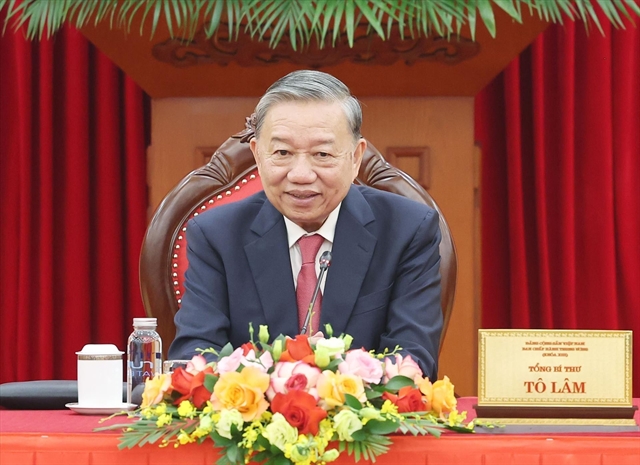 Politics & Law
Politics & Law


|
| Party General Secretary Tô Lâm delivers keynote address at the national conference on implementing the Resolution of the 11th Plenum of the 13th Party Central Committee, held in Hà Nội on Wednesday. VNA/VNS Photo Thống Nhất |
HÀ NỘI — Party General Secretary Tô Lâm has emphasised that leadership personnel at all levels, particularly those selected for the 14th National Party Congress, must be individuals of integrity, competence, vision and dedication.
“There is no room for opportunists, careerists, mediocre or hesitant officials, or those resistant to change and focused on personal gain,” he stated.
His remarks came while chairing the national conference on implementing the Resolution of the 11th Plenum of the 13th Party Central Committee, held in Hà Nội on Wednesday. The conference was conducted in person at the National Assembly House and virtually connected to over 21,000 locations nationwide, including central agencies, ministries, departments and local-level offices.
Speaking at the event, Lâm underscored the importance of the resolution, calling it a pivotal step in creating new momentum and driving national development into a new era.
Following unanimous agreement, the Party Central Committee officially issued Resolution No 60/2025, which focuses on two strategic priorities: streamlining and restructuring the state apparatus and administrative units and preparing for the 14th National Party Congress.
These are urgent and foundational tasks that must begin immediately and continue through the end of 2025.
Given the scope and importance of these efforts, the General Secretary called on all levels of the Party to thoroughly study and implement the resolution through concrete plans and actions.
“We must show the highest political determination to carry out what is, in essence, a revolution in restructuring the state apparatus and driving reform for national progress,” he declared.
He urged Party committees and leaders to be hands-on and resolute in leading implementation, ensuring that every official and Party member deeply understands the significance of this undertaking.
“We must create unity in thought across the Party and spread this spirit throughout society,” he said.
He also called for coordinated, disciplined and energetic implementation from central to local levels and among localities, stressing that all efforts must serve the common interest of the people and the nation.
Regarding the post-reform administrative system, Lâm emphasised the need for a leaner, more efficient and modern governance model, capable of delivering rapid, sustainable development and contributing to national defence, diplomacy and economic progress.
He stressed the importance of innovation, digital transformation and scientific advancement, alongside continued improvement in the quality of life for citizens. Localities, he said, must take initiative and responsibility in planning the reorganisation of commune and ward-level administrative units.
In addition, Lâm stressed that streamlining the political system and merging provinces and communes is not merely a matter of organisational restructuring or administrative boundary adjustments. It also involves redefining economic space, the division of responsibilities, governance levels and the allocation of resources for development.
He emphasised the need to avoid two problematic tendencies in the reorganisation process. These include merging communes or wards into excessively large units that resemble mini-districts, which makes it difficult for local authorities to effectively manage their jurisdictions or serve the people and merging units that are too small, which results in limited space for development, constrained growth potential and an overly complex system with too many administrative nodes, leading to inefficiency and bureaucracy.
Given these challenges, Provincial Party Standing Committees must deliberate carefully and plan strategically, with a long-term vision and a mindset rooted in national and public interest, to develop the most rational and effective reorganisation plans.
On personnel matters, the General Secretary reaffirmed the principle of the Party’s unified leadership in managing organisational structure and staffing. He called for transparency, accountability and tight control of power, linking authority with individual responsibility. He warned against disunity, corruption, cronyism and the manipulation of appointments, stressing the need to avoid group interests and waste in personnel decisions.
Special attention must be paid to the selection of capable and upright leaders, especially those heading provincial and local agencies.
“Personnel work has always been vital and it is even more so under today’s new requirements. The primary criterion for any appointment must be job performance, only then should other factors be considered,” he concluded. — VNS